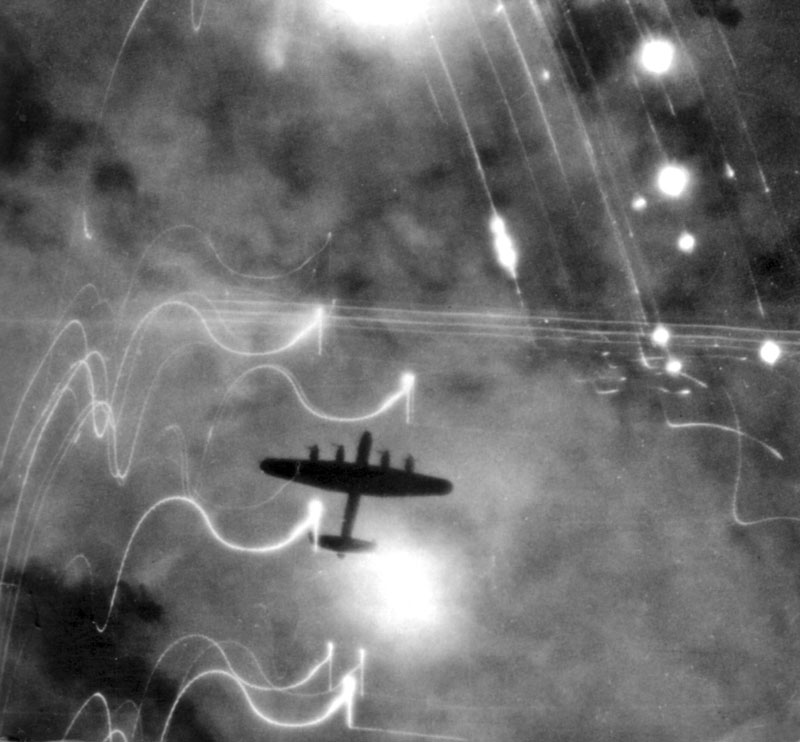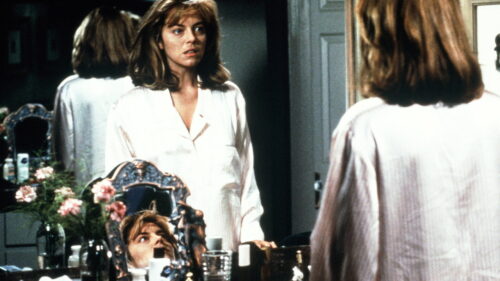The following is a transcript of a conversation between myself and RogerEbert.com contributor Steven Boone about “Untold History,” a multipart documentary series about U.S. history that aired last year on Showtime and that has just become available on Blu-ray and for download. Directed and narrated by Oliver Stone, who cowrote the series and a tie-in book with historian Peter Kuznick, the program offers an alternative take on the last 70+ years of the nation’s history. The series got a good amount of coverage on news and editorial pages but not so much on entertainment sites, for a variety of reasons. Boone and I both found it fascinating, both as a work of interpretive research and as a revealing labor of love by Stone, who has always been fascinated by the intersection of history and drama. — MZS

Matt Zoller Seitz: Steven, where do you think this series fits in Oliver Stone’s lineup of work? I ask because when it aired on Showtime last year, it was treated as a bit of an odd duck. It got coverage in the political press but not so much from TV critics, who I sensed perhaps did not know what to make of it—or how much to make of its political aspects? Or maybe they just didn’t even want to go there, or they decided Stone was a crank and they were done with him? I don’t know. In any case, this was not an “American Masters” special where you can just go, “Yeah, it was pretty good, but there should have been more stuff about Johnny Carson’s marriages.” It’s deeper and broader than that. You have to really engage with it.
And it’s pretty no-frills in terms of its approach. We’re seeing the contents of a guy’s mind, or at least it feels that way. This is Oliver Stone on U.S. history, and world history, with help from the historian Peter Kuznick and his own research, and from all of his video editors.
Watching it on Blu-ray again recently, I was struck by how personal it obviously is to Stone.
Steven Boone: Maybe this series stands out because his visual approach is even more aggressive than any of his other documentaries, more in line with his features (particularly “JFK” and that “Ben Hur” moment with Jamie Foxx and Al Pacino in “Any Given Sunday“) and the pastiche, pop culture-raiding BBC documentaries of Adam Curtis.
MZS: I thought of Adam Curtis as well, whom I hope readers will familiarize themselves with, if they haven’t already. He’s a British documentarian who makes these ruminative, very personal pieces on history and politics, such as “The Century of the Self” and “How We All Became Richard Nixon.”
I reviewed this series for Vulture last year and was quite taken with it. It was one of my favorite nonfiction programs of the year, along with Ken Burns’ “The Dust Bowl,” which I loved for very different reasons — because of the emotion of it, the affecting stories of loss. “Untold History” has a lot more sweep, obviously, because it covers a nearly 75-year period. But it’s also intimate, because Stone directed every episode himself, and he’s sitting there narrating the entire thing, in this wonderful, cultivated East Coast accent that in parts reminds me—strangely, considering Stone’s politics—of William F. Buckley. But at the same time, paradoxically, it’s cooler, more detached, because the filmmakers are taking the wide view, or the long view.
And then there’s the editing, which does feel very much like the editing in montages from Oliver Stone movies—which is to say, they feel like a speeded-up version of the editing of some old newsreel (“News on the March!”) or some other “official” mode of information delivery. But the information is not telling the “official” story, as the series’ title promises, but the “untold” part. Or “mostly untold.” Or “conveniently avoided.”
Boone: Yes, I think harsh critics of this film make a bit too much of the title “Untold History”—even though I agree with Stone and his co-author Peter Kuznick about how rarely the facts they cover get aired in, say, public schools. It’s just that the interpretation, focused on the proverbial People’s perspective, is what’s so rare. I did expect Howard Zinn and his popular book “A People’s History of the United States” to get a huge shout-out somewhere in there. So there’s an inevitable collision of folks’ expectations based on the title, and a general disdain for historical documentaries that push a very strong, unapologetic political interpretation from one side of the spectrum.
It all comes down to the facts and how persuasively one thinks he’s built an argument from them. As for the narration, I was daydreaming of late NFL Films narrator John Facenda (AKA The Voice of God) reading Stone’s stormy copy. Stone is an irrepressible dramatist, and that’s what I love about the dude.

MZS: Speaking of “how rarely” these facts get covered in public schools: while I was rewatching parts of the series for this talk, my daughter, who’s sixteen, came in the room during the part about the research into the atomic bomb and America’s role in World War II. She stood there and watched for a long time as Stone talked about the death toll of World War II. She had no idea so many Russians and French and English and other non-German, non-American soldiers died in the war. Even though they covered all that stuff, however briefly, in her public school, the overall sense she got from her books, and from American popular culture, was that Germany was whipping the world’s behind until the United States stepped in and saved everybody.
She said, “Is that not true?” Meaning, the part about Germany having the world on the ropes until we stepped in and saved everyone.
And I said, “Not exactly. We made a difference, definitely, and I guess you could make the case that maybe we tipped the scales a bit, but if we did make a difference, it was because Russia and England and other enemies of Germany had done so much of the suffering before we got involved. And it took a really long time for us to commit to getting involved in the war against the Germans and their allies.”
She didn’t know about that. They didn’t cover it—or maybe she was absent during the class period when they covered it. It’s not something American history classes dwell on, in any case. The “World War II ended! We won!” thing is alive and well in a lot of classrooms. I mean, we lost just under a half a million people in World War II, and we were really in it in it, heavily invested in the war, for a few years, in the Pacific and in Europe. But other countries lost millions of people. Millions! And they were in it for much longer.
That’s just one little aspect of the record that Stone and Kuznick…well, I don’t want to say “correct,” because people tend to get their backs up when you use that word, and it’s not entirely fair to “Untold History.” So let’s say “expand.” He’s expanding our view of what happened, or contradicting it in some places, or subverting it. But in general when you watch this thing you get a sense of American history being enlarged from what you might know of it, and being connected to international history, which I kind of think might actually be the central, not-so-secret goal here, to say, “Hey, you know what? It’s not all about us.”
Boone: Yes, if you listen carefully, Stone and company are framing this narrative as a story of America as a member of a community. Sometimes we were good neighbors, sometimes we were drunk and disorderly, some times we went around picking pockets and climbing through windows.
Stone’s approach seems to treat us as if we’re the spoiled daughter of a drug lord who hasn’t seen much of life outside the family compound and vacations. We’re learning about where the money and prosperity came from and why some of those people out there on the street are so angry at daddy. So many Americans are still sheltered from that side of history, in the 21st century! It’s outrageous, and you can sense in the density of Stone’s narration and the urgency of his montage, the scramble to get Americans of all political stripes accustomed to the notion that we are not #1—that there is no #1, and that the world should not be organized around a concept of #1.
To that end, he spends a lot of time praising sane, brave and humane policy decisions by our traditional enemies. Some of his praise of the Russian people during WW II and the U.S.’s leading hand in the Cold War would have been enough to get Stone exiled in the 1950s.
MZS: I think it’s important to point out here that when the filmmakers are praising something Stalin did tactically or geopolitically in World War II, they aren’t saying, “Contrary to what you’ve heard, Stalin was a great guy, and the Soviet Union was an altogether wonderful place to live.” It’s not a case of, “Not many people know this, but the Fuhrer was an excellent dancer.” Stone is not just pouring negativity on American history, just to be a jerk about it, to tick off America Firsters. He’s doing something else here, him and Kuznick. The ship of consensus about the United States’ history and her role in the world has been sailing unimpeded in a particular direction for decades, and Stone and Kuznick want to nudge it a bit in this direction, or that direction, and eventually try to—well, not turn it around, because that’s probably impossible, but just change that course a bit.
I feel like they’re saying, “OK, Americans, let’s not get too full of ourselves here.”
I think he even spells that out in the very first episode, in the personal prologue, where he says that the United States has truly great ideals for the most part but has done a generally poor job of living up to them, with some exceptions. That there’s too much hypocrisy, too much looking the other way for the sake of money or power.
I don’t think that’s a radical view of anything, honestly. I just don’t. But it’s radical for television documentaries about history. Even PBS, which is tarred as “leftist” by conservatives, doesn’t air stuff like this, because they’re afraid of being boycotted or defunded. That’s why they’re aren’t many systemic critiques of history on PBS, or The History Channel—because it’s dramatically easier as well as politically safer to tell stories about personalities and emotions, and get into the actual politics, the actual history, tangentially.
And if Stone and Kuznick go off in a particular direction that people aren’t comfortable with for whatever reason, I feel like it really needs to be judged in relation to the consensus about what our history is, with this series as one little part of that. It’s not that they’re saying, “Everything you learned is b.s.” The title says how you’re supposed to view this: here are some things you might not have heard.
Boone: I have to agree with that and revise my own statements a little bit, regarding Stone the sensationalist. It’s nothing at all like, let’s say, a leftist opposite number of Fox News. At the root of the operatic quality and emotionalism in almost all of his historical pageants is not rage but heartbreak.
That’s what the musical score of this series is selling, just as John Williams sold it in his scores to “Born on the Fourth of July” and “JFK.” Stone points out pivotal moments where a more just, humane policy decision could have been made, but certain leaders succumbed to almost mob-like pressure, to project strength, to serve certain financial interests, etc. Stone sees tragedy in all this, and he’s careful to articulate that tragedy in numbers: the astonishing death tolls from various preventable wars.
This is the Stone whose empathy extends to Vietnamese villagers and Russian peasants but also to Richard Nixon (“Nixon“) and George W. Bush (the Bush, Jr. in “W” is a blinkered young American who would probably weep at the revelations in “Untold History”).

MZS: I wasn’t surprised that Untold History was hard on President Ronald Reagan, making him seem intellectually incurious and belligerent, kind of a late twentieth century model of know-nothingness, and really conscienceless when it came to asserting American power via covert war. And George W. Bush even more so.
But I was a little surprised, I guess, by how hard he was on Obama. I mean, he doesn’t cut the guy any slack at all beyond the racial/historical significance of his election, which he agrees is considerable. There’s a line in the episode that deals with the “War on Terror” period of recent history where he gets into Obama continuing Bush’s foreign policy and extending and expanding it, and his narration says something like, “America’s capacity for self-love proved boundless.”
There’s a level of disgust in the Obama sections that’s really stinging—a sense of, “I expected better from this guy,” or maybe, “I really wanted to expect better from this guy.” And maybe that he expected more from the citizenry as well, for the people who leaned left, to say, “I wanted this guy to be more than he ended up being, and I can see where he failed, and it makes me angry.”
Boone: I wasn’t so surprised at the Obama critique. He supported him back in 2008, but guardedly. Stone doesn’t much trust any office holder outright to be what seems to be his ideal leader, Henry A. Wallace, the ridiculed Roosevelt vice president and Truman commerce secretary.
MZS: The reclamation of Henry Wallace is really delightful. The filmmakers seem to have a bit of a crush on him, if historians can be said to have crushes.
Boone: Yeah, I loved the Wallace reverie. Just as a moviegoer, I love when filmmakers marshal all of their forces to stick up for somebody they see as unjustly persecuted or dismissed. And I happen to agree on that one. Yet it’s more about the policy posture that Wallace represented: pacifism and true diplomacy.
I must disagree with you on one thing: That kind of stance is radical in the present scheme of things. Nothing gets you ejected from the conversation faster than pushing 100% pacifism, as Wallace’s career testifies.
MZS: Throughout this thing, you get the sense of political decisions being driven mainly by the desire of governments—and the companies that truly control government decisions, indirectly—to have access to resources. To make money.
I liked this. It rang true to me. It’s not reassuring, but it rang true to me. The contest between German and Russia in World War II is shown as being mainly about control of resources, and the desire to settle certain border disputes once and for all. The Cold War, ditto — mainly a resource thing, or a “market share” thing as an advertising guy might put it, with the ideological fig leaf of Communism vs. capitalism providing cover for all the spying and covert wars, and the propping up and tearing down of governments—all of which, as this series points out, had more to do with resources than a lot of school textbooks care to admit.
Boone: Exactly, and he includes at the beginning of Episode 7 a snippet of arguably Martin Luther King’s greatest speech, “Beyond Vietnam,” delivered April 4, 1967, a year to the day from his death. It’s his great antiwar speech, and the second half of it (not included in the episode) basically psychoanalyzes America’s greed and war jones, warning us of a future that ended up happening, an American decline based in large part on commitment to constant foreign adventure and an obese war machine. Stone does the same thing at the end of the series, concluding, like King, that its the hearts and minds of the powerful that must be transformed. I’d call it ridiculously idealistic if I thought Stone believed it even possible. But he puts it out there, as did King, like a prayer.












